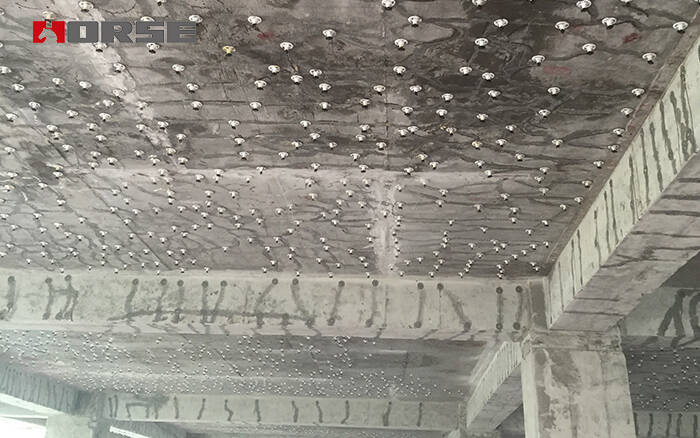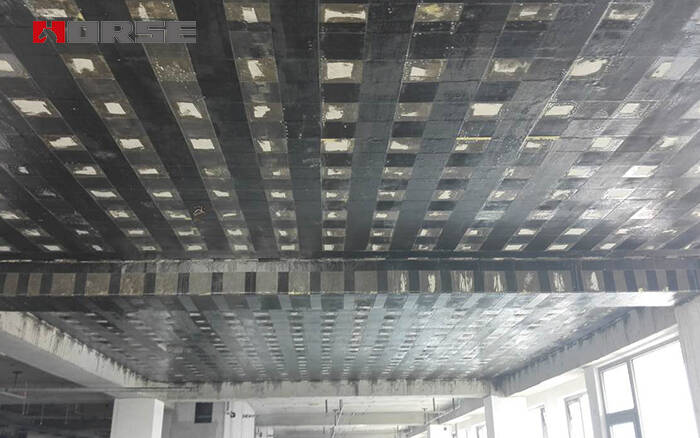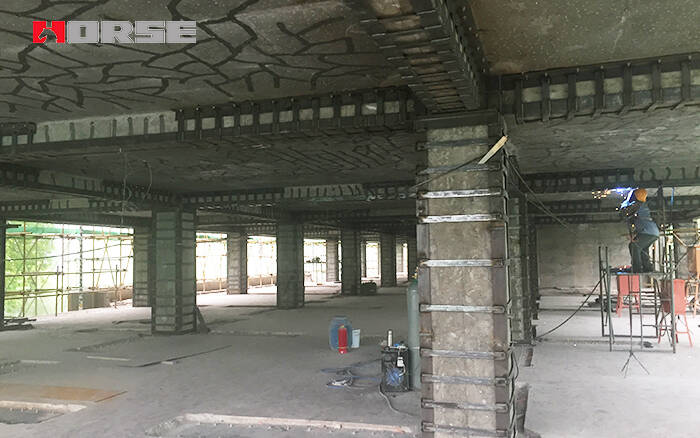Renforcement des dalles
renforcement de la dalle avec un adhésif de réparation de fissures, un revêtement en PRFC et une plaque d'acier
La résistance du béton ne peut pas répondre aux exigences de conception, la plage de largeur des fissures est différente, la largeur des fissures de la dalle dépasse la valeur autorisée de la norme 0,3 mm, des mesures de renforcement des fissures sont donc prises.
Aperçu du projet
Le 2 novembre 2007, le bâtiment de l'Association islamique du Ningxia a été coulé sous pression. Le système de support du gabarit étant instable, une section de béton s'est effondrée. La septième couche de béton s'est fissurée. La résistance du béton ne répondait pas aux exigences de conception. La largeur des fissures était différente, et la largeur des fissures de la dalle dépassait la valeur standard autorisée de 0,3 mm. Des mesures de renforcement ont donc été prises pour les fissures.
La procédure de construction
1. traitement des fissures :
1) Nettoyer la poussière flottante et autres débris dans la zone fracturée. La construction peut être réalisée après un certain degré de séchage.
2) Pour les fissures dans les dalles de largeur inférieure à 0,3 mm, après nettoyage de la base, appliquer uniformément 2 à 3 couches de colle de renforcement structural à base de résine époxy modifiée, absorbant les liquides, à faible viscosité et perméable par capillarité à la surface du béton, dans le sens d'extension de la fissure, pour fermer le canal de fracture.
3) Pour les fissures statiques indépendantes de largeur comprise entre 0,3 et 1 mm, après traitement, injecter une colle de réparation de fissures récupérable sous une certaine pression, à faible viscosité et à haute résistance, dans les fissures de la base, pour fermer le canal de fracture.
4) Pour les dalles de largeur supérieure à 1 mm, injecter un coulis haute pression pour réparer les fissures en indentant la cavité de fracture et en fermant le canal de fracture.

(réparation des fissures de la dalle avec l'adhésif d'injection de fissures HM-120L)
2. polymère renforcé de fibres de carbone lié extérieurement (PRFC)
>> Traitement de la surface du béton
La couche superficielle, l'huile, la saleté, etc. de la surface du béton doivent être éliminées au burin, puis une couche de 1 à 2 mm d'épaisseur doit être poncée à la meuleuse d'angle. Les éléments en béton doivent être traités en chanfreinant les angles, puis la poussière doit être soufflée à l'air comprimé après le polissage. Enfin, la surface doit être essuyée avec un chiffon en coton imbibé d'acétone et maintenue sèche avant utilisation. Si le béton doit être renforcé avec des fissures existantes, choisissez d'abord la colle de perfusion HM-120M ou la colle de coulée pour fissures HM-120L, à appliquer selon la taille de la fissure, puis renforcez.
>>Construction d'apprêt
Lors de la construction, les deux composants des apprêts A et B ont été pesés selon les proportions prescrites pour la colle préparée, puis versés dans un récipient propre et mélangés jusqu'à homogénéité (il est préférable de mélanger dans le même sens pour éviter la formation de bulles d'air). Une brosse ou un rouleau a été utilisé pour appliquer uniformément la colle sur la surface du béton. Une fois la couche de colle sèche, il a fallu la brosser plusieurs fois selon les circonstances, en veillant à ce que l'épaisseur de la couche ne dépasse pas 0,4 mm. Il ne fallait pas manquer de brosser, ni laisser couler ni former de bulles, en attendant le durcissement de la colle (le temps de durcissement dépendait de la température du site, il était préférable que la colle soit sèche au toucher, généralement au moins 2 heures). Ensuite, l'opération suivante était lancée. La colle préparée devait être utilisée une fois pendant la durée de séchage.
>>Construction de nivellement
Les pores et les défauts de la surface du béton ont été comblés avec de la colle de ragréage. En cas de creux, la colle de ragréage préparée a été utilisée pour réparer et combler les zones enfouies et grattées. Les différences de hauteur, telles que les joints des gabarits, ont été comblées avec de la colle de ragréage, en essayant de minimiser la différence de hauteur. Le traitement des angles a consisté à les réparer en formant un arc lisse avec de la colle de ragréage, dont le rayon ne dépassait pas 20 mm. Une fois la colle de ragréage durcie (le temps de durcissement dépendait de la température du site, généralement au moins 2 heures avant qu'elle ne soit sèche au toucher), l'étape suivante a pu être poursuivie.
>>Pâte de tissu en fibre de carbone
L'adhésif imprégné de fibre de carbone a été appliqué uniformément sur la zone à coller, en particulier dans les coins. Après avoir tendu et aligné le tissu en fibre de carbone, utilisez une raclette en plastique ou un rouleau (un rouleau à peinture dont les villosités ont été retirées) pour appliquer la colle plusieurs fois dans le même sens, jusqu'à ce que la colle s'écoule. Appliquez ensuite l'adhésif imprégné uniformément sur la surface extérieure du tissu en fibre de carbone et appliquez plusieurs fois. Assurez-vous que l'adhésif imprégné puisse immerger le tissu de deux manières.
En cas de collage multiple, appliquez la couche suivante jusqu'à ce que vos doigts soient secs. Si le tissu en fibre de carbone doit être superposé, appliquez la couche suivante.
>>Séchage et conservation
Protégez la surface de la construction de la pluie et de l'humidité 24 heures après la fin des travaux et veillez à ce qu'elle ne soit pas heurtée par des objets durs. Lorsque la température moyenne de l'air est de 20 à 25 °C, le temps de durcissement ne doit pas être inférieur à 3 jours ; lorsque la température moyenne de l'air est de 10 °C, le temps de durcissement ne doit pas être inférieur à 7 jours.

(polymère renforcé de fibres de carbone lié à l'extérieur (PRFC))
3. plaque d'acier collée à l'époxy
1. Nettoyage de la surface du substrat
2. Traçage du tracé
3. Ancrage
4. Préparation de la surface de la plaque
5. Collage de la plaque d'acier avec la colle structurale
6. Entretien
7. Vérification
8. Revêtement de protection

(renforcement de la dalle avec plaque d'acier collée époxy)